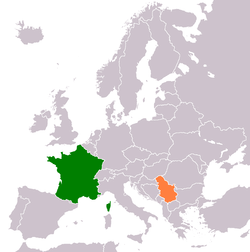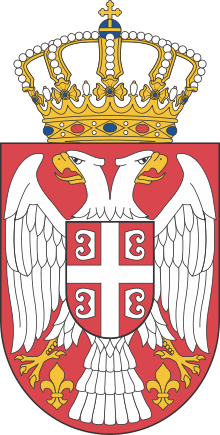France–Serbia relations
 |
|
France |
Serbia |
|---|---|
French-Serbian relations are foreign relations between France and Serbia. Both countries established diplomatic relations on January 18, 1879, between French Third Republic and Kingdom of Serbia.[1] France has an embassy in Belgrade. Serbia has an embassy in Paris, with diplomat Dr. Predrag Simić. Serbia also has 2 consulates (in Lyon and Strasbourg).[2] Both countries are members of United Nations, Council of Europe, Partnership for Peace, and Organization for Security and Co-operation in Europe (OSCE). After a short period of severance caused by the 1999 NATO bombing of Yugoslavia, France’s diplomatic relations with Serbia (then the Federal Republic of Yugoslavia) were restored on 16 November 2000.[1][3] Since 2006, Serbia is an observer on the Francophonie.[4]
There are between 70,000 and 100,000 people of Serbian descent living in France.
History
Serbia and France have a history of sincere and noble relations. Those where seriously shaken with France participation in 1999 NATO bombing of Yugoslavia, and Kosovo war, but have been improving since 2000.

The oldest documented possible contact between the two sides was the marriage of Stephen Uroš I of Serbia and Helen of Anjou. The first important contacts of French and Serbs came only in the 19th century when French travel writers first wrote about this Balkan country.[5] In the 19th century, Karađorđe Petrović, leader of Serbian Revolution, sent a letter to Napoleon expressing his admiration, while in the French parliament, Victor Hugo made a speech asking France to assist Serbia and to protect the Serbian population from Ottoman crimes.[6] Rapid development of bilateral relations followed, so that the people in Serbia saw a great new friend in "mighty France", that could protect them from the Ottomans and Habsburgs.[5] Relations between Serbia and France continued to improve until the First World War, when the "common struggle" against a common enemy reached its peak. Before the war France won the sympathy of the Serbian population by building railways, opening French Schools, a Consulate and a French Bank. Several Serbian kings from this period studied at universities in Paris, as well as large part of the future diplomats.[5] Serbs gained a sense of Francophile because all these activities moved them away from the Ottoman and Habsburg empires.[5] The Serbian-French alliance until 1914 even threatened the traditional inclination towards Russia. Great humanitarian and military assistance was sent by France to Serbia during the First World War, including assistance in the evacuation of children, civilians and military at the end of the war, and the support of French newspaper headlines. Even today, these actions remain deeply ingrained in the collective consciousness of a large number of Serbs.[5]
Kosovo

When Kosovo declared its independence from Serbia on 17 February 2008, France became one of the first countries to announce officially about recognition of sovereign Kosovo. Following Wikileaks report, France has made clear that Serbia can not enter the EU without recognizing Kosovo's independence.[7] France participated in the 1999 NATO bombing of Yugoslavia, which resulted in a UN administration of Kosovo and then to eventual independence. France currently has 1,368 troops serving in Kosovo as peacekeepers in the NATO led Kosovo Force. Originally there was 7,000 French troops in KFOR.[8]
Cooperation
With the signing of the Agreement on the Succession of Interstate Treaties on 26 March 2003, the procedure of consolidation of the treaty status between the two countries has been completed. Among the treaties, the most important ones are: the Agreement for the Protection of Investments (1974); the Agreement on the Avoidance of Double Taxation (1974); the Convention on Social Security (1950); the Agreement on Cultural Cooperation (1964); the Agreement on Road Transport (1964).[1] In 2005, the volume of trade between the two countries was US$453,827 million.[1] Serbian and French Presidents Boris Tadić and Nicolas Sarkozy signed in Paris at April 2011 a political declaration meant to support Serbia's EU integration.[9]
See also
External links
- French Ministry of Foreign Affairs about relations with Serbia
- French embassy in Belgrade (in French and Serbian only)
- Serbian Ministry of Foreign Affairs about relations with France
- Serbian embassy in Paris(in French and Serbian only)
- Serbs in France NGO
- French-Serbian friendship site (in French and Serbian only)
- Serbian Orthodox Church in France (in French and Serbian only)
- Serbian-French association (in French and Serbian only)
- Serbian-French cultural and sports association (in French and Serbian only)
Notes and references
- 1 2 3 4 Serbian Ministry of Foreign Affairs about relations with France
- ↑ "Serbian embassy in Paris (in French and Serbian only)". Amb-serbie.fr. Retrieved 2011-06-10.
- ↑ France and Serbia Political relations
- ↑ Serbia at www.francophonie.org
- 1 2 3 4 5 Sretenović, Stanislav (2009), Francusko-srpski odnosi u XIX i XX veku (PDF), Belgrade, Serbia: Institut za međunarodni politiku i privredu
- ↑ Quotations From VICTOR HUGO
- ↑ France: Serbia may not be part of EU without recognizing Kosovo
- ↑ "Kosovo Force (KFOR)" www.nato.int Link accessed 21-07-09
- ↑ Serbia, France sign strategic partnership agreement

